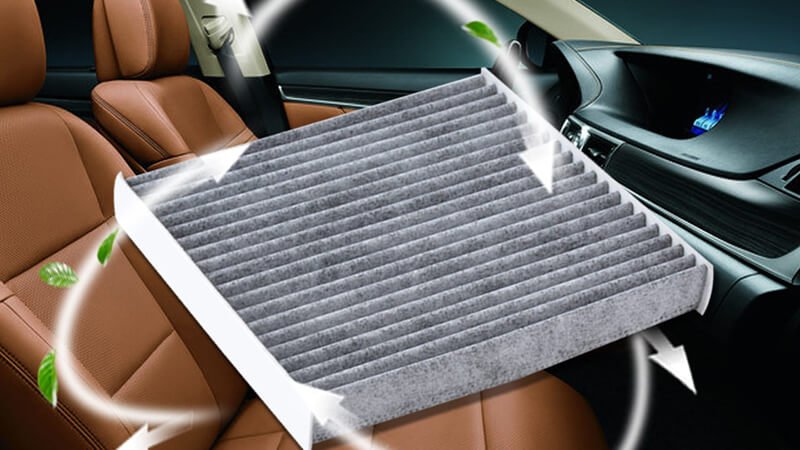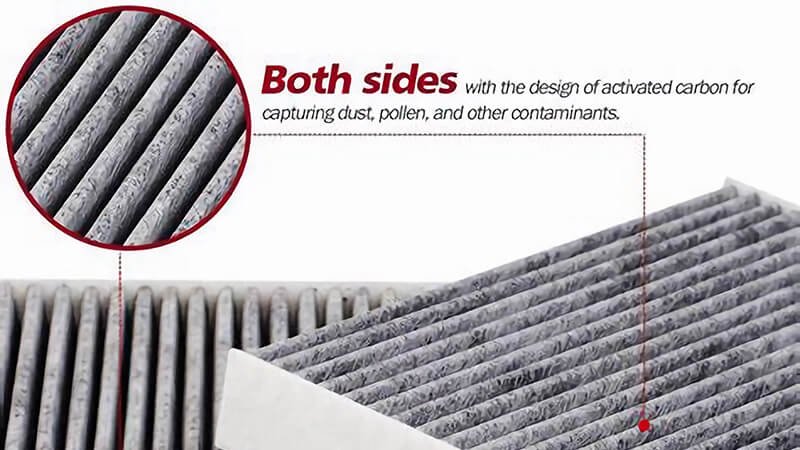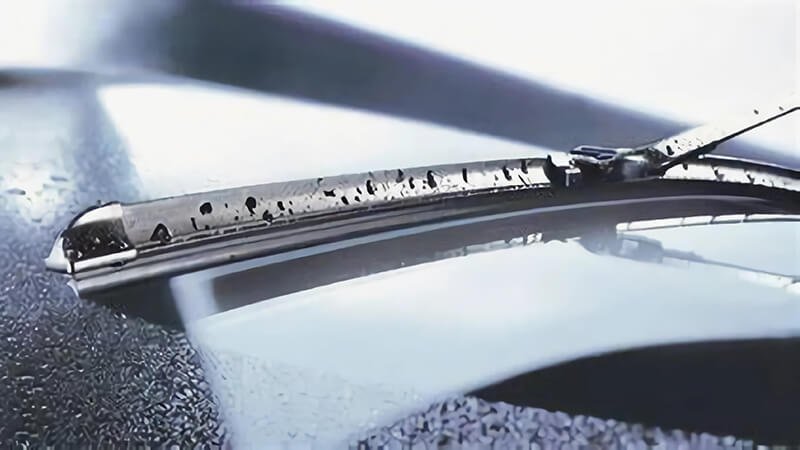When it comes to upgrading your car's air filter, you might wonder if a HEPA filter is a good option. After all, HEPA filters are known for their exceptional ability to capture tiny particles. But can a regular car air filter simply be swapped with a HEPA filter? Let’s take a closer look at the key considerations.
Swapping a regular auto air filter with a HEPA filter isn’t as simple as it sounds. While HEPA filters provide excellent filtration, they may not fit properly or be suitable for your car’s specific system. It's essential to consider the compatibility before making such a change.
Now that we’ve raised the question, let’s explore the details of why swapping a regular car air filter with a HEPA filter might not be as easy as it seems. Understanding the functionality and compatibility of these filters can help guide your decision.

Can I Put a HEPA Filter in My Car?
HEPA filters are widely praised for their superior filtration capabilities, but can they be used in cars? It's a common question, especially for those looking to improve their vehicle’s air quality. But will a HEPA filter actually work in your car?
While HEPA filters can trap very fine particles, they aren’t always compatible with your car’s system. Cars are designed to have specific airflow requirements, and HEPA filters might restrict that flow, leading to potential performance issues. Always check your vehicle's specifications before replacing the air filter.
HEPA filters1 are known for their ability to capture particles as small as 0.3 microns, which is why they are often used in environments where air quality is critical, like hospitals or clean rooms. However, car air filters are designed for different purposes. They primarily aim to filter larger particles like dust, debris, and pollen from entering the engine. A standard auto air filter is generally built to balance airflow while keeping engine performance in mind.
Engine Efficiency and Airflow
HEPA filters are denser and designed to capture the smallest of particles. While this is beneficial for air quality, it’s a problem for vehicles that require a consistent airflow to the engine. The engine relies on a certain volume of air for the combustion process, and reducing this airflow can decrease engine performance2, efficiency, and overall power. A HEPA filter, being much more restrictive, can hinder this necessary airflow.
Filter Housing Design
Another consideration is the physical design of your car’s air filter compartment. Most cars are designed with a specific filter size and structure, which may not accommodate the dimensions and shape of a HEPA filter. Even if the filter does fit, it could cause gaps that would allow unfiltered air to pass through, defeating the purpose of using a filter in the first place.
It’s crucial to consult your vehicle’s manual to see the type of air filter it’s designed for. If you still want to improve air quality, consider upgrading to a high-performance air filter3 that is designed to work efficiently with your car’s system while still providing enhanced filtration.

What Are the Two Disadvantages of HEPA Filters?
Although HEPA filters are celebrated for their filtration capabilities, they come with a few downsides. What are the two key disadvantages of using a HEPA filter in your vehicle or home? Let’s break them down.
HEPA filters offer impressive filtration, but they can reduce airflow and have limited lifespan in certain conditions. These disadvantages are crucial to consider before opting for a HEPA filter, especially in automotive applications.
HEPA filters are well-known for their ability to capture 99.97% of particles that are 0.3 microns or larger. But while their filtration efficiency is outstanding, they have certain limitations, especially when used in non-ideal conditions like automotive systems.
1. Restriction of Airflow4
The primary disadvantage of HEPA filters is the significant restriction on airflow. Their dense material and fine mesh structure are designed to trap smaller particles, but this comes at the expense of air volume. In a vehicle, proper airflow is essential for both the engine and HVAC system to operate efficiently. If a HEPA filter is installed, it may cause the engine to receive less air, impacting fuel efficiency, performance, and even engine longevity. Similarly, in the cabin, less airflow can mean poor ventilation, reduced air quality, and a strained HVAC system.
Table: Effect of Airflow Restriction on Vehicle Performance
| System Component | Impact of HEPA Filter | Regular Filter |
|---|---|---|
| Engine | Reduced airflow, lower combustion efficiency, decreased power output | Optimal airflow, efficient combustion |
| Fuel Efficiency5 | Decreased, due to poor engine performance | Optimal, as airflow is balanced |
| HVAC System | Reduced airflow, potential overheating of components | Consistent airflow, effective cooling/heating |
2. Shorter Lifespan in Harsh Conditions6
HEPA filters excel in controlled environments but struggle in more challenging conditions. Cars are exposed to dirt, moisture, and extreme temperatures, all of which can clog a HEPA filter more quickly than typical air filters. In a vehicle, the constant exposure to contaminants can lead to a faster buildup of debris on the HEPA filter, reducing its efficiency and lifespan. This leads to higher replacement costs and more frequent maintenance.
Table: Lifespan Comparison of HEPA and Regular Auto Filters
| Filter Type | Expected Lifespan | Common Issues |
|---|---|---|
| HEPA Filter | 6 months to 1 year | Clogging due to fine dirt particles, reduced airflow |
| Regular Filter | 1 year to 2 years | Gradual clogging, minimal impact on airflow |

Can I Put a HEPA Filter in My AC?
You might be tempted to use a HEPA filter in your home air conditioning system, especially if you’ve heard about its efficiency. But can a HEPA filter be used in your AC system, or would that cause more harm than good?
While HEPA filters can technically be used in some AC systems, they are not always ideal. Many AC systems are designed for different types of filters, and a HEPA filter could cause airflow issues or strain the system.
Similar to the case with car air filters, replacing the standard filter in your AC system with a HEPA filter7 isn’t always a good idea. Air conditioning systems are designed for filters that balance airflow and filtration. A HEPA filter is highly effective at trapping small particles, but it is also much denser than typical AC filters. This increased density can reduce the airflow through the system, causing the AC to struggle to maintain its cooling capacity.
Airflow and Energy Efficiency
When a HEPA filter is used in an AC system, it can reduce the airflow significantly, forcing the system to work harder to circulate air. This increases energy consumption, and over time, it can strain the motor and other components. The increased workload on the AC system could lead to higher energy bills and potentially shorten the lifespan of the unit.
System Compatibility
Most AC systems are designed to use a filter that is not as dense as a HEPA filter, making it more suitable for the system’s airflow requirements8. Installing a HEPA filter that doesn’t fit properly could create air gaps or cause a less effective filtration process. To ensure your system operates efficiently, always check your AC unit’s filter specifications before opting for a more advanced filter.
Table: HEPA vs Regular Filter in AC Systems
| Filter Type | Pros | Cons |
|---|---|---|
| HEPA Filter | Captures fine particles, improves air quality | Reduces airflow, increases energy consumption9, can strain AC system |
| Regular Filter | Efficient airflow, optimal system operation | May not capture as fine particles as HEPA |

Are Car Air Filters Interchangeable?
Car air filters come in a variety of types, but are they interchangeable? Understanding whether you can swap one air filter for another is essential for maintaining your vehicle’s performance. Let's explore this topic further.
Car air filters are generally not interchangeable. Each vehicle has specific requirements for its air filtration system, including the size, shape, and material of the filter. Replacing it with the wrong type can cause performance issues or damage the system.
Car air filters10 are designed to meet specific needs based on the vehicle model and engine specifications. They vary in size, material, and filtration capacity11, making them largely non-interchangeable. Even small changes in the filter’s size or material can result in poor performance or even engine damage.
Filter Size and Fitment
Each car manufacturer designs their vehicles with specific air filter sizes and compartments. A filter that fits one model might not fit another, even if they are from the same brand. An improperly fitted filter could allow unfiltered air to enter the engine, which could lead to contaminants damaging the internal components.
Material and Performance
Air filters are made from various materials such as paper, foam, and synthetic fibers. Each material offers different levels of filtration and airflow capacity. Using a filter made from a material not suited to your car’s engine could affect the engine’s ability to breathe properly, reducing fuel efficiency and performance.
Table: Filter Types and Vehicle Compatibility
| Filter Type | Engine Compatibility | Airflow Efficiency | Filtration Efficiency |
|---|---|---|---|
| Standard Filter | Most vehicles | Balanced airflow | Filters larger particles |
| High-Performance Filter | Sports/performance vehicles | High airflow for power | Filters smaller particles for better performance |
| HEPA Filter | Rarely compatible | Low airflow | High filtration of fine particles |

Conclusion
Choosing the right air filter12 for your vehicle is important for maintaining performance and air quality. While HEPA filters offer excellent filtration, they may not be suitable for all cars due to compatibility issues. Always check your vehicle’s specifications and consult with a professional to ensure you’re making the best choice for your vehicle's air filtration system.
-
Explore the advantages of HEPA filters in improving air quality, especially in critical environments like hospitals. ↩
-
Learn how different air filters impact engine performance and efficiency, crucial for vehicle maintenance. ↩
-
Discover top-rated high-performance air filters that enhance filtration without compromising engine efficiency. ↩
-
Understanding airflow restriction is crucial for optimizing vehicle performance and ensuring efficient engine operation. Explore this link for detailed insights. ↩
-
Fuel efficiency is vital for cost savings and environmental impact. Discover how HEPA filters influence this aspect of vehicle performance. ↩
-
Learn about the durability of HEPA filters in challenging environments and their maintenance needs to make informed choices for your vehicle. ↩
-
Explore this link to understand the pros and cons of HEPA filters in AC systems, ensuring you make an informed decision for your home. ↩
-
Discover the airflow requirements for AC filters to ensure your system runs efficiently and effectively, avoiding potential issues. ↩
-
Learn about the impact of HEPA filters on energy consumption in AC systems, which can help you save on bills and maintain efficiency. ↩
-
Explore this link to discover top-rated air filters that enhance vehicle performance and engine health. ↩
-
Understanding filtration capacity is crucial for maintaining engine efficiency; this resource will provide valuable insights. ↩
-
Get your best OEM cabin air filter, clcik this link to get good price for your business. ↩













